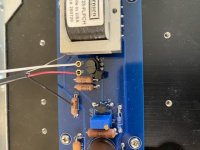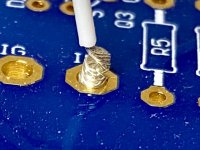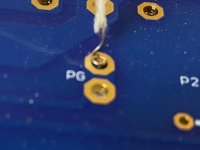StewMac on Amazon
https://smile.amazon.com/StewMac-AN...s=stewmac+wire+stripper&qid=1634684076&sr=8-5
Jokari 20050
https://smile.amazon.com/dp/B002BDNL4Q?psc=1&ref=ppx_yo2_dt_b_product_details
Best
Bob
https://smile.amazon.com/StewMac-AN...s=stewmac+wire+stripper&qid=1634684076&sr=8-5
Jokari 20050
https://smile.amazon.com/dp/B002BDNL4Q?psc=1&ref=ppx_yo2_dt_b_product_details
Best
Bob
solid core,tinier, the better
twisted nicely
I like that and I believe it's better than chunkier options
How would you solder this connection?
Attachments
get more of the same solid wire, strip it, then coil a bit around the end of the wire you want soldered to the PCB
On the flip side, if ever the wires to big for the PCB hole, strip the wire then cut a few stands from it before tinning in prep to solder to PCB. If its solid core wire, file some off until it fits the hole
There's always a way to make something fit a hole 😉
On the flip side, if ever the wires to big for the PCB hole, strip the wire then cut a few stands from it before tinning in prep to solder to PCB. If its solid core wire, file some off until it fits the hole
There's always a way to make something fit a hole 😉
Last edited:
How would you solder this connection?
plenty of pics on my Blog
Allan, I had a similar thought. Might try it
ZM, I checked your blog but this ole guy couldn't find a picture or even locate where to look. I'm challenged in that area, and probably others.
Link please ��
ZM, I checked your blog but this ole guy couldn't find a picture or even locate where to look. I'm challenged in that area, and probably others.
Link please ��
Not sure how ZM does it. However, I find it simple to:
Strip the wire
Tin the pad with enough solder to flow to both sides of the board
Heat the pad / solder and insert the wire
Trim the wire
Strip the wire
Tin the pad with enough solder to flow to both sides of the board
Heat the pad / solder and insert the wire
Trim the wire
Hello IntoJaz,
Easiest way I know of to solder a smaller wire into a larger hole is to strip more insulation off and fold the wire over (1,2 or more times) so that it comes close to fitting tightly into the hole. Then solder it. Works good for me.
Greg
Easiest way I know of to solder a smaller wire into a larger hole is to strip more insulation off and fold the wire over (1,2 or more times) so that it comes close to fitting tightly into the hole. Then solder it. Works good for me.
Greg
I have 2 options:
24 awg stranded silver plated copper with Teflon insulation. Picture #1
26 awg solid core pure silver that's wrapped in cotton. Picture #2
The photos show a spiral wrap of wire (thanks Allan) for each.
What do you think?
24 awg stranded silver plated copper with Teflon insulation. Picture #1
26 awg solid core pure silver that's wrapped in cotton. Picture #2
The photos show a spiral wrap of wire (thanks Allan) for each.
What do you think?
Attachments
Not sure what you mean by a pin into the board. I'm guessing an adapter of some kind?
Where can I see something like that?
Where can I see something like that?
The wire choice will pretty much depend on the rest of your system and your taste. Silver-plated copper, teflon insulated could be bright... solid core silver may sound better - but the silver has to be annealed to sound really nice. Properly annealed, it will sound beautiful - fast & pleasing at the same time, with great space/extension bottom to top, with no hints of roughness/edginess; annealed silver will also preserve the natural harmonics (where an un-annealed silver will produce unnatural harmonics that will start bothering you on a long run...)
Insert the pins into the PCB and then try different types and configurations until you find one that suits you best; then solder it permanently - straight to the PCB. This will ensure that you do not damage the PCB eyelets 🙂
If you do not have any hum/buzz, you could try a very slight twist - no need to twist them tightly. This will preserve the space/extension and highs. Again, experiment and find what suits you best.
Do not discard the copper wire... try solid core pure copper.
Then, once done playing... let us know what you chose.
Insert the pins into the PCB and then try different types and configurations until you find one that suits you best; then solder it permanently - straight to the PCB. This will ensure that you do not damage the PCB eyelets 🙂
If you do not have any hum/buzz, you could try a very slight twist - no need to twist them tightly. This will preserve the space/extension and highs. Again, experiment and find what suits you best.
Do not discard the copper wire... try solid core pure copper.
Then, once done playing... let us know what you chose.
Last edited:
With regard to soldering a pin onto the board:
Something like this:
Security Check
They exist in 1 mm and 1.3 mm diameter, and I have some that are either silvered or even solid silver (don't remember where I got those, they were leftovers from my first period of electronics diy decades ago ... 😀)
Regards, Claas
Something like this:
Security Check
They exist in 1 mm and 1.3 mm diameter, and I have some that are either silvered or even solid silver (don't remember where I got those, they were leftovers from my first period of electronics diy decades ago ... 😀)
Regards, Claas
Not sure what you mean by a pin into the board. I'm guessing an adapter of some kind?
Where can I see something like that?
Something like this: https://www.distrelec.ch/en/wire-wrap-pins-pu-pack-of-100-pieces-vogt-1365b-68/p/30073086
Thanks Boky, good insight. I'm guessing the power leads to the amp boards wouldn't have to be higher quality? Just signal stuff.
And I'm searching for some pins now, excellent
And I'm searching for some pins now, excellent
these may also work - I use them in places where I may need to evaluate resistors🙂
Single Pin Machined Socket Uninsulated-standard g/g: Phoenix Enterprises -PE- Connectors IC Sockets Tools Cable Wire
Single Pin Machined Socket Uninsulated-standard g/g: Phoenix Enterprises -PE- Connectors IC Sockets Tools Cable Wire
Something more like this, sized for the hole.
https://www.mouser.com/ProductDetai...YYWix-IrPsNvHSVF3rMlk5zvB1aHGrghoCjwQQAvD_BwE
https://www.mouser.com/ProductDetai...YYWix-IrPsNvHSVF3rMlk5zvB1aHGrghoCjwQQAvD_BwE
Those are cool.
😎
The simpler ones OTOH have the advantage that the wire can be removed a little easier? (apply heat, pull wire off with a tweezer, works best if the the wire was not wrapped too tightly)
😎
The simpler ones OTOH have the advantage that the wire can be removed a little easier? (apply heat, pull wire off with a tweezer, works best if the the wire was not wrapped too tightly)
- Home
- Amplifiers
- Pass Labs
- Input wire


